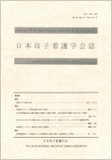Japanese
English
- 有料閲覧
- Abstract 文献概要
- 参考文献 Reference
目的
乳児の泣きに対する母親の反応及び対処行動を生後1か月から4か月までを縦断的に把握し、母親に対する支援を検討することを目的とした。
対象と方法
正常な分娩経過であり健康で退院した4名の母親を対象に、質的記述的研究を用いた。半構成的面接と参加観察によりデータを収集し、逐語録を起こした。起こした逐語録から研究テーマに関連した内容を抽出し、質的記述的に分析を行った。
結果
生後1か月から4か月の乳児の泣きに対する母親の反応ならびに対処行動を分析した結果、コード化したデータは992であった。コード化したデータから53のサブカテゴリーが抽出され、さらに5のカテゴリーが抽出された。5のカテゴリーは【児の泣きに対する感情・情動】、【児の泣きを母親が感じ取る】、【児の欲求を満たすための行動】、【児の泣きに対する思い】、【児の泣きを母親が受け入れる】であった。母親は生後1か月では児の泣きに対して否定的な感情を示し、生後2か月から3か月をピークに激しい泣きを感じ取っていた。母親は、児の泣きを感じ取り、児の欲求を満たすための行動を繰り返し、泣きの意味が理解できるようになったという自信が見られ、生後4か月には泣きに対する好ましい感情を示し、泣きを受け入れることができていた。
結論
乳児の泣きに対する母親の反応ならびに対処行動について、母親が捉えた泣きの解釈に基づいて児の欲求を満たすための行動を繰り返すことで、児の泣きを受け入れることに繋がっていた。母親は、生後2か月から3か月をピークに児の激しい泣きから否定的感情を多く示していたことや、生後4か月に入っても母親の思いはゆらぎやすいことから、母親へのサポートが重要な時期である。看護職者は、母親及び家族に対し乳児の泣きに対する知識や育児技術の提供、心理的サポートなどの支援が必要であることが示唆された。
Objective
The present study aimed to longitudinally investigate maternal reactions and coping behaviors regarding infant crying between one and four months after birth in order to identify maternal support needs.
Subjects and Methods
Subjects comprised four mothers who were discharged from hospital in good health following a normal birth. Data were collected using semi-structured interviews and participant observation. Content related to maternal reactions and coping behaviors regarding infant crying between one and four months after birth was extracted from the verbatim transcripts and qualitative descriptive analysis was performed.
Results
A total of 992 items of coded data were identified and grouped into 53 subcategories within the following five categories: feelings and emotions regarding infant crying; maternal perceptions of infant crying; behaviors to satisfy infant needs; attitudes toward infant crying; and maternal acceptance of infant crying. Mothers displayed negative feelings regarding infant crying at one month after birth, and perceived a peak in intense crying between two and three months after birth. Subsequently, mothers perceived the infant crying, repeatedly behaved in ways that satisfied infant needs, and showed confidence in understanding the meaning of the crying such that by four months after birth, they showed affinity toward and became able to accept infant crying.
Conclusion
With regard to maternal reactions and coping behaviors regarding infant crying, repeatedly behaving in ways that satisfied infant needs based on perceived interpretations of the crying led to acceptance of infant crying. At the peak of intense crying between two and three months after birth, mothers displayed many negative emotions, and were prone to fluctuations in attitude even after entering the fourth month after birth, thus indicating the importance of maternal support during this period. The present findings suggest the need for nursing support such as psychological support and the provision of information regarding infant crying and parenting techniques to new mothers and other family members.
Copyright © 2015, The Japan Maternal and Infant Caring Association All rights reserved.


